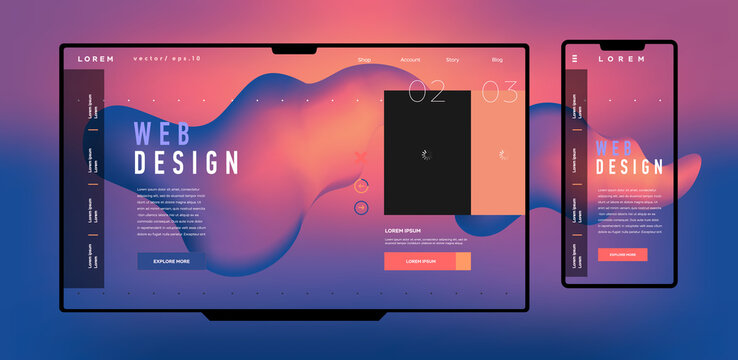Personalized Website Design Solutions for Retail Websites
Leading Tips for Developing an Impactful Website Style That Transforms
To accomplish this, one need to think about a variety of factors, including recognizing the target audience, focusing on user experience, and optimizing for mobile platforms. The calculated use of engaging call-to-actions and a well-defined aesthetic power structure plays a critical function in leading individuals via their journey.

Understand Your Target Target Market
Comprehending your target audience is basic to effective site design, as it prepares for producing an engaging individual experience. Determining that your individuals are, including their demographics, preferences, and habits, allows designers to customize the website's web content, format, and performance to meet specific needs.
Conducting detailed market research study is crucial in this procedure. Surveys, meetings, and analytics can provide useful understandings right into customer expectations and discomfort factors. By compiling this information, developers can develop customer personalities that stand for different sectors of the target market, ensuring that style choices are informed and relevant.
Moreover, understanding the target audience aids in picking appropriate design aspects such as color design, typography, and images that reverberate with users. A web site that speaks directly to its audience promotes a sense of connection and trust, encouraging longer brows through and higher conversion prices.
Eventually, a user-centered strategy to website design not just improves individual complete satisfaction yet additionally supports organization purposes by driving engagement and commitment. By focusing on the demands and choices of the target audience, a website can effectively offer its objective and attain desired end results.
Prioritize User Experience
To enhance the total effectiveness of an internet site, prioritizing individual experience (UX) is crucial (Website Design). A well-designed UX makes sure that visitors can navigate the website easily, find details swiftly, and engage with material meaningfully. This results in boosted individual complete satisfaction and greater conversion prices
Begin by implementing intuitive navigating. Menus needs to be practically structured, allowing users to locate key locations of the website with very little effort. Uniformity in design aspects, such as color schemes and typefaces, cultivates knowledge, which is important for keeping user engagement.
In addition, take into consideration the loading speed of your site. A delay of just a couple of seconds can lead to significant drop-offs, as individuals are less likely to wait for a slow-loading web page. Streamlining images and enhancing code can boost performance and preserve visitors.
By prioritizing individual experience, you not just produce a much more satisfying setting for visitors but likewise strengthen your brand's integrity. Eventually, a focus on UX is a financial investment in the lasting success of your internet site.
Maximize for Mobile Devices
Optimizing for mobile gadgets is important in today's electronic landscape, where an enhancing number of individuals access internet sites with mobile phones and tablets. A mobile-friendly style not only enhances individual experience however likewise plays a significant function in enhancing internet search engine rankings. To achieve this, it is important to embrace a responsive layout that immediately readjusts to various display dimensions and orientations.

Filling speed is an additional vital element; mobile users are normally less patient and expect quick access to information. By focusing on mobile optimization, you make sure that your site remains competitive and efficiently engages a wider target market.
Usage Engaging Call-to-Actions
An internet site's efficiency often pivots on its capacity to direct site visitors towards wanted actions, making compelling call-to-actions (CTAs) crucial parts of style. CTAs work as the essential points that route individuals to involve with the site, whether that implies purchasing, registering for a newsletter, or downloading and install a resource.
To produce effective CTAs, clarity is extremely important. Use succinct language that plainly connects the activity you desire the user to take.
In addition, the design of CTAs need to stand apart without being interfering. Utilize contrasting shades and clear typefaces to ensure they capture focus. In addition, think about using directional signs, such as arrows or pictures, to guide customers toward these buttons. By concentrating on these elements, businesses can dramatically improve customer engagement, driving conversions and eventually attaining their internet site's objectives.
Focus on Visual Pecking Order
Efficient website layout counts heavily on a well-structured aesthetic hierarchy that overviews individuals via web content effortlessly. By arranging aspects why not look here in a way that focuses on info, developers can boost user experience and help with decision-making. This entails making use of size, color, contrast, and spacing purposefully to attract interest to one of the most vital components of a webpage.
Using bigger fonts for headings and subheadings develops a clear distinction between various areas, allowing customers to check content easily. In addition, utilizing contrasting colors for buttons and calls-to-action can catch individual focus and motivate interaction. Whitespace is another necessary element; it stops clutter and enables customers to focus on key top article messages without distractions.
Images and graphics should match the message while also adhering to the well established power structure, enhancing the total message (Website Design). Uniformity in style elements, such as color pattern and typography, further reinforces the aesthetic pecking order, making navigating user-friendly

Verdict
In verdict, efficient internet site layout necessitates a detailed understanding of the target audience, prioritization of user experience, and mobile optimization. Eventually, a well-executed website layout serves as an essential component in driving customer activities and achieving business purposes.